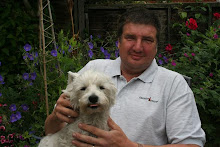 |
There are some wonderful macro-photographers posting pics
to the internet, so (with permission) I will use this one of a
worker by Tim Hill to head up this post. Thanks Tim. |
Our little group of 7 candidates for the Intermediate Level Beekeeping "written practical" exam taken back in March in Longford all passed. I got 81%, so I was delighted personally but pleased too for the group and especially pleased that we did well for our group leader, the Longford BKA 'Sec', Elspeth, who worked so hard preparing notes and hand outs for our study sessions. We are all very pleased with ourselves. This post will mainly be based around this process, so if you are not interested in beekeeping then you might like to click on by.
 |
| L'Aimant (The Lover) |
These 'courses' and exams are an important part of what the Federation of Irish Beekeeper Associations (FIBKA) does and there are plenty of them. If studying and exams are your thing you can progress through the baby-slopes of the half hour, 20 questions 'Preliminary' paper, through three 'Intermediate' exams, up to three 'Senior' exams after which you can call yourself a 'Bee Master'. Onwards and upwards there are then routes into 'proper' academia, with degrees in apiculture and equally high flying qualifications in honey production and so on. No doubt this is all important if you fancy a career in the commercial beekeeping world and these FIBKA certificates would be recognised internationally as proof of competence. Most people seem to do the exams for fun or just to prove they can.

Most of these exams have to be 'sat' in the FIBKA home-base at Gormanston, near Drogheda just north of Dublin, but if your County BKA can field a minimum number of candidates, FIBKA allow you to run the exams locally and appoint proper invigilators and send the papers out in sealed envelopes not to be opened before the exam time and in the exam hall. Hence our 'Magnificent Seven' in Longford. So, we did our study-group evenings and we took our exam and now we are all passed, proud owners of Intermediate Certs in "written practical" (hive and colony management). The obvious next step would be for us all to sit the Intermediate level "scientific" paper (bee biology and anatomy, honey chemistry, bee pheromones etc) followed by undergoing an apiary practical test where FIBKA examiners meet you at your own hives and test your competence at any number of manipulations and tasks - finding the queen, identifying types of queen cell, splitting colonies to produce 2nd hives or colonies and so on.
 |
| 'Rhapsody in Blue' |
Instead, I find myself at a bit of a crossroads and if you will bear with me, I will now ramble on in a rather disjointed, philosophical manner whilst I try to get my head round the problem. As I said - feel free to click on by. There are bee keepers and there are bee keepers - we range from the almost obsessive keeper who, like a golfing nut, spends all his time and money on the hobby, buying all the latest gadgets and gizmos, different types of hives, expensive honey extraction equipment, fancy suits, hive tools and smokers, fancy fuel for the smoker, chemicals and medication.
 |
| 'Joseph's Coat' |
These keepers are into the hives at every opportunity cracking the hive apart to inspect the colony condition, tweaking, manipulating, killing baby queens if they do not want them, trying out all the techniques they have learned, attempting to prevent any swarming, squeezing every ounce of honey production they can get out of the bees. They frequently extract so much honey that their bees would not have enough resources to see them through the winter, so these keepers have to feed back sugar syrup or fondant to replace the 'stolen' reserves. The bees must get no peace but these techniques work at the required level, so they have gone into the canon and are accepted practice among the FIBKA experts. These are the skills at which you must show competence in order to progress through the exam-machine and to be recognised by FIBKA as an expert and 'Bee Master'. These are also the things you are told you "must do" at BKA meetings. Going to meetings and getting involved in clubs are right up there with all the practical stuff you are obliged to learn to get on in the beekeeper world.
 |
| Red campion |
At the other end of the scale are a much more laisséz faire bunch, some of whom are content to have bought their hive and their bees to look pretty in the garden and they are happy to sit back in the sun-lounger, watching the bees fly to and fro, happily buzzing round the flowers. They don't need the honey, so they don't even extract it. Down towards that end are a more recent group calling themselves 'Natural Beekeepers', who are not quite so laid back, but are mainly driven by the need to be green and ecological. They have bees to support the local population of pollinators but they do not fuss and interfere with the colonies, they try never to use chemicals on their bees (varroa mite pesticides for example) - you will just end up with a colony of bees which needs man and chemicals to survive, they argue. Far better to let the bees 'learn' over time to groom off the mites.
 |
| Fruit scones from the baker's assistant. |
These guys tend to be viewed sceptically by the 'experts' - weirdo hippies and eco-warriors. There is no real place for them in FIBKA although, to be fair, they do get a slot in the FIBKA magazine and the 'Natural' way does get air-time in the FIBKA conferences. Also I do not think they would meet the exam standards, so they are never going to make 'Bee Master' unless they can talk a good game on the day.

My 'crossroads' is because I am starting to baulk at the demands and advice to constantly interfere, examine, poke and prod, and I am much more inclined to watch them from outside the hive and, if they look healthy to me, leave them be. I know I 'should' be checking for varroa mites, for example, and treating with the latest 'drug' recommended by the experts, but plenty of feedback has come down to say that these chemicals can kill or damage the queen, make the bees abscond or, just as bad, not work anyway. The one we used last year, called MAQS is basically a formic acid fumigant which is so honkingly strong that you choke when you are out in the open air peeling open the packaging - you then stick the strips into an 18 inch cube enclosed box (the hive) with little ventilation and expect it to diffuse right down into the capped larval cells to kill the mites without harming the bees. Hmmm. No wonder we beginners are confused and start to doubt the official view.
 |
Mum turkey starts a new secret egg stash
down between the poly tunnel and the
caravan |
I find myself not at all sure I want to be that kind of expert. My current tendency is to go with the Natural Beekeepers and minimise my interference and poking, and possibly to withdraw from the exam-taking path. One strong factor tries to draw me in again. Our 'leader' Elspeth, mentioned in the first paragraph is a Scot and comes from that generation of Scottish girls who were, rather appallingly, never allowed to do science at school. Girls would not need science, it was decided by the Scottish education authorities, so they were not let do it and Elspeth, at this later stage finds herself protesting this by her determination to learn the stuff and sit the exam just to show them. She was so good to us last time round that I expect there is not one among the other 6 of us who do not feel that if she can do it, then we all ought to damned well stand by her and support her through it. Come September, when we have to sign up or not, it will be interesting to see how many of we science-trained blokes are on the list.

I am sorry if that was a bit long winded, but it is a post that has been building up in the back-burners of my brain and needed unloading, venting onto this blog. Blogging as catharsis, if you like. One wise 'old timer' in our club, a beekeeper of 50+ years experience who has never taken one of these exams in his life, just smiles and says "It doesn't matter what you do in the end; the bees will do their own thing anyway!"
 |
| New garden strip all dug over. |
The main news to tag onto the end is that we have finished digging the new garden strip out front, so that can now get its membrane, fancy gravel and plants. We are also going to move the roses from the 'Rose Walk' into here. They do OK in there but suffer from the thug-weed 'creeping buttercup' getting in amongst them, so we have fun times ahead lifting them, root-washing them to get out all traces of the buttercup and then dropping them into the new site where, we hope, the weed cannot jump into bed with them.

Then today, on a run down to Roscommon town the car went sick on us again, which is a bit of a nuisance. It made some odd noises, ran hot for a while but then cooled down again, seemed to lose power so that we stopped to take a look under the bonnet (and turned the engine off, obviously) to find it smelling of very hot oil and smoking off some the oil that inevitably builds up on old engines. We had to get it recovered back to our garage in Lough Glynn where our excellent 'man who can' is now looking at it. We suspect head gasket or some other serious problem but of course (wouldn't you know it) when the guy fired it up after its nice cooling period in Roscommon and on the lorry, it fired up beautifully and ran as smoothly as you'd like. More on this story when we know what's what.














No comments:
Post a Comment